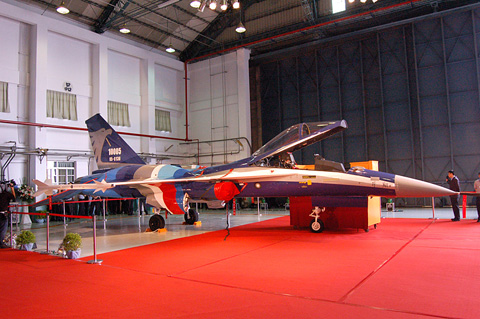The Ministry of National Defense yesterday dismissed media reports that it had halted plans to upgrade the Taiwan-made Indigenous Defense Fighter (IDF) warplanes at the request of the Cabinet to avoid undermining closer ties with Beijing.
Vice Minister of National Defense Lin Yu-pao (林於豹)aid at the legislature that both arms procurement from the US and the Hsiang Chan Project (翔展計畫) would proceed as scheduled.
The Hsiang Chan Project includes enhancing the IDF’s firepower, lengthening its range and providing it with the capability to attack Chinese radar control systems, runways, fuel depots and amphibious troops.

PHOTO: HSU SHAO-HSUAN, TAIPEI TIMES
Lin said the project was of tremendous importance to the nation’s defense industry and that there was a major discrepancy between media reports and reality.
The ministry said that the government’s position on the matter had not changed.
The ministry’s response came after the Chinese-language Liberty Times (the Taipei Times’ sister newspaper) quoted an unnamed military source as saying that the Cabinet had instructed the ministry to end the project next year.
The report said the Cabinet would still allocate next year’s NT$1 billion (US$32.8 million) budget for the Hsiang Chan Project, but that the Air Force should use the money for other purposes.
The report said that military officials were surprised by the Cabinet’s request, as in the past it would only ask the military to revise a budget and had never before canceled a project.
Military analysts were quoted as saying that the Cabinet could have made the decision to facilitate Taipei’s ongoing efforts to improve relations with Beijing.
Taiwan began to develop the IDF in 1980, when the US was unwilling to provide it with F-16s. Taiwan built 130 IDFs with the help of defense firm General Dynamics, which manufactures the F-16.
In 1992, Taiwan succeeded in ordering 150 F-16A/Bs from the US and 60 Mirage 2000-5s from France.
As the IDFs were more than 20 years old, and the Aerospace Industry Development Corp (AIDC) launched the NT$7 billion Hsiang Chan Project to upgrade the aircraft.
On March 29 last year, AIDC unveiled the first two upgraded IDFs to former president Chen Shui-bian (陳水扁).

Nvidia Corp yesterday unveiled its new high-speed interconnect technology, NVLink Fusion, with Taiwanese application-specific IC (ASIC) designers Alchip Technologies Ltd (世芯) and MediaTek Inc (聯發科) among the first to adopt the technology to help build semi-custom artificial intelligence (AI) infrastructure for hyperscalers. Nvidia has opened its technology to outside users, as hyperscalers and cloud service providers are building their own cost-effective AI chips, or accelerators, used in AI servers by leveraging ASIC firms’ designing capabilities to reduce their dependence on Nvidia. Previously, NVLink technology was only available for Nvidia’s own AI platform. “NVLink Fusion opens Nvidia’s AI platform and rich ecosystem for

‘WORLD’S LOSS’: Taiwan’s exclusion robs the world of the benefits it could get from one of the foremost practitioners of disease prevention and public health, Minister Chiu said Taiwan should be allowed to join the World Health Assembly (WHA) as an irreplaceable contributor to global health and disease prevention efforts, Minister of Foreign Affairs Lin Chia-lung (林佳龍) said yesterday. He made the comment at a news conference in Taipei, hours before a Taiwanese delegation was to depart for Geneva, Switzerland, seeking to meet with foreign representatives for a bilateral meeting on the sidelines of the WHA, the WHO’s annual decisionmaking meeting, which would be held from Monday next week to May 27. As of yesterday, Taiwan had yet to receive an invitation. Taiwan has much to offer to the international community’s

CAUSE AND EFFECT: China’s policies prompted the US to increase its presence in the Indo-Pacific, and Beijing should consider if this outcome is in its best interests, Lai said China has been escalating its military and political pressure on Taiwan for many years, but should reflect on this strategy and think about what is really in its best interest, President William Lai (賴清德) said. Lai made the remark in a YouTube interview with Mindi World News that was broadcast on Saturday, ahead of the first anniversary of his presidential inauguration tomorrow. The US has clearly stated that China is its biggest challenge and threat, with US President Donald Trump and US Secretary of Defense Pete Hegseth repeatedly saying that the US should increase its forces in the Indo-Pacific region

ALL TOGETHER: Only by including Taiwan can the WHA fully exemplify its commitment to ‘One World for Health,’ the representative offices of eight nations in Taiwan said The representative offices in Taiwan of eight nations yesterday issued a joint statement reiterating their support for Taiwan’s meaningful engagement with the WHO and for Taipei’s participation as an observer at the World Health Assembly (WHA). The joint statement came as Taiwan has not received an invitation to this year’s WHA, which started yesterday and runs until Tuesday next week. This year’s meeting of the decisionmaking body of the WHO in Geneva, Switzerland, would be the ninth consecutive year Taiwan has been excluded. The eight offices, which reaffirmed their support for Taiwan, are the British Office Taipei, the Australian Office Taipei, the